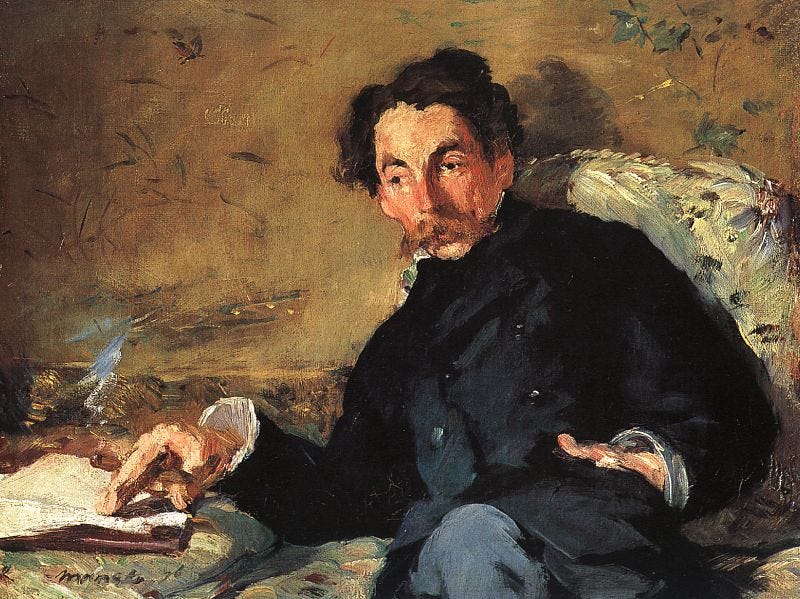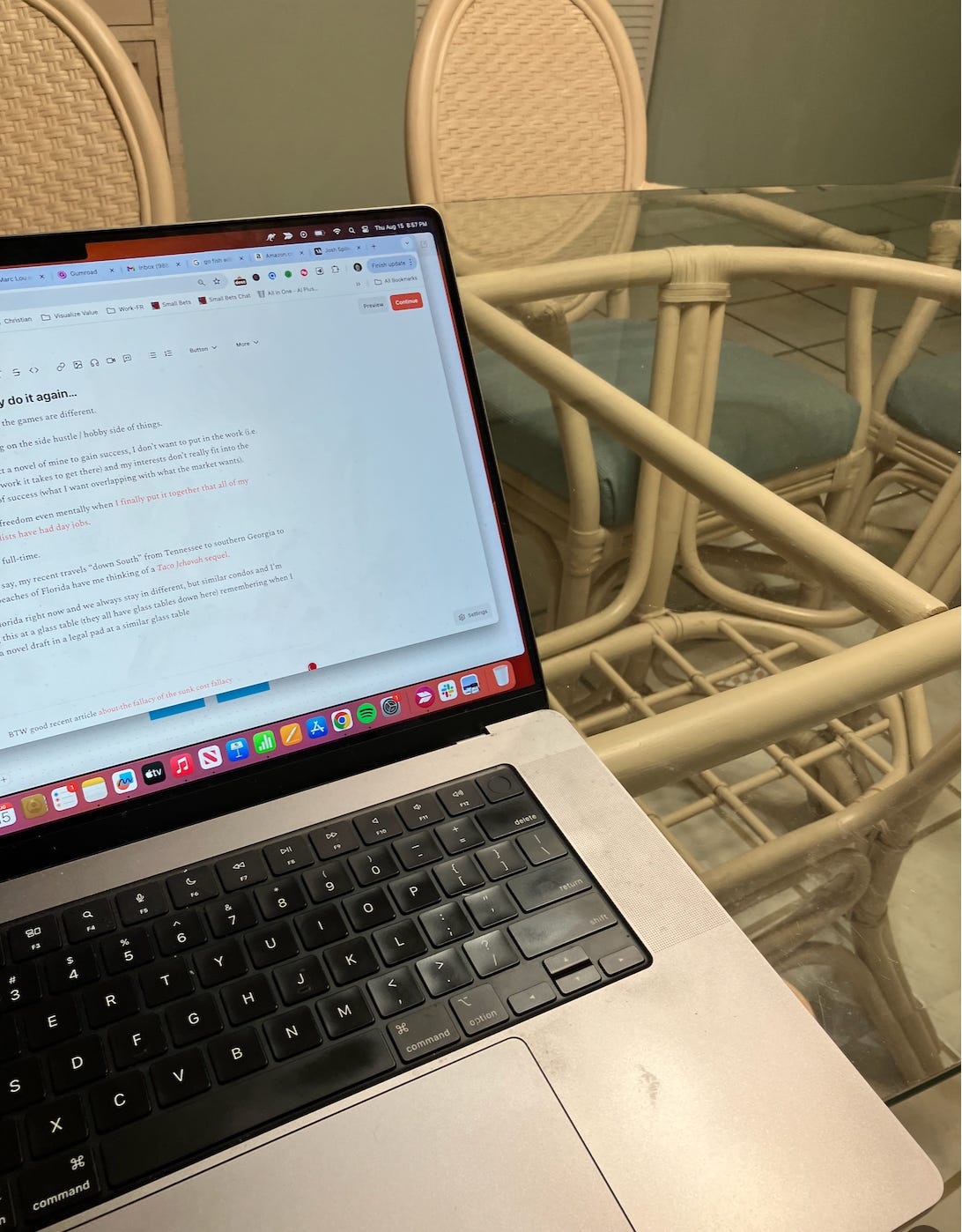I’ve written 2 novels, maybe 3, depending on how I classify my error-riddled novella, which came before the novels.
All three in aggregate were the worst financial decisions I’ve ever made.
I’m ready to be accused of massive hyperbole, because none of them sent me spiraling into debt, none of them ruined my marriage, even though 2 ended up being self-published, and I spent money on them (ironically, the novella was not self-published).
The novels didn’t sell much, not that I really expected them too…remember, the odds are (forever) stacked against novelists, self-published or not.
No one asked me to write a novel
No other writer or mentor suggested that I do it
But it was one of those things that I really wanted to do.
I felt compelled.
Something to check off the bucket list or whatever.
Something my kids can read one day and then have no interest in again.
So why was it a bad financial decision?
The opportunity cost.
I lost the ability to do something else with that time. It was gone.
And it took a lot of work.
Work that in no form or fashion met any type of minimum wage requirements.
What did I make?
Perhaps $100?
Probably $50?
Honestly, I don’t want to know or track it.
The hours are countless, but then I did spend real money getting a very nice editor/publisher and person who likes the type of writing I like to create a cover and lay it out and he has done this for several indie authors which is great.
Expectations though
If I really would have expected something grand from these projects, I would have done something different.
I would have sent it off to agents and publishers and tried to make “connections” or something.
Or I would have come up the established, but non-MFA way — submit to literary magazines that no one reads except for book publishing people and professors and hope that my amazing writing would make an impression or something like it, and then go from there.
At least that’s the route for the writing I like, slightly offbeat metafictional contemporary literature.
The hobby that could be something else
I’ve come to think of my fiction writing and this newsletter too as something that could make money, and something that people do make money from, but that doesn’t mean you should make money from it.
It’s like the person who likes woodworking. They make a nice dresser for their guest bedroom. It took months to build. One of the drawers is a little off, but it works and hey, the don’t use it every day—it’s in the guest room and they don’t care because they only stay a few days.
Building a dresser took a lot of time. And sweat. And some money for the right tools.
Hours upon hours after their regular job.
No one asked them to build a dresser for the guest room.
They could have bought one at the store.
People make money from dressers, you know.
But then there’s another level, one that’s slightly deceiving…
They even sell custom furniture at the store down the road.
“What if you know had them to take a look? Maybe you could sell it on consignment?” someone asks.
Not a bad idea. They build one. Months upon months. Hours upon hours. The store doesn’t care. The guest room already has a dresser. They don’t need another one.
They list it on it on Craigslist.
A few offers. “You know they sell this for a lot cheaper at the store?” someone replies.
The dresser is taking up too much space in the garage. Grandma would like a rocking chair not a dresser and there’s no room left to build the rocking chair.
The dresser price is cut. The time was wasted.
It finally sells. They just need to get rid of it.
I’ll mercifully stop with the metaphor, but you get the point.
Once commerce is involved the pursue-your-passion-hobby becomes something slightly different.
Sometimes I compare the work I did then to the people who do make money on their side hustles.
The indie hackers who bring in $60k a month after so many failures.
The writers who seem to get lucky and make it big.
Maybe the woodworker who did find success with their custom-made dressers.
It’s just a different game.
You can play poker or Go Fish with the same deck of cards.
The incentives are different with each.
Not being clear on which game you’re playing is the hard part.
Back to the opportunity cost…
My main problem is I started one game, but wanted it to be another. 1
I saw professionals and thought I could play in that the same sphere without following all of the “rules” they did.
I get coached a lot to start a side hustle with what I do with my day job (marketing and SEO).
I’ve done it a few times, I even sold a course that made ~$14k. Not retirement money, but nothing to sneeze at either.
I didn’t create another course on that though I’ve thought about it and I didn’t follow up all of my leads and create an insatiable offer they couldn’t refuse…It’s coming up on 3 years and I’ve thought about updating it, maybe / maybe not.
I didn’t, because I didn’t want to make something that started as a lark into another job.
I (generally) like working for other people.
That said, I have tried to make a few more dollars writing about writing and productivity, slightly different than this newsletter. That seems more like a literal game, than with my novels. But that’s just me.
But I’ll probably write another novel again…
Because I recognize the games are different.
And I’m okay being on the side hustle / hobby side of things.
I don’t ever expect a novel of mine to gain success, I don’t want to put in the work (i.e. the non-writing work it takes to get there) and my interests don’t really fit into the Venn diagram of success (what I want overlapping with what the market wants).
I’ve felt more freedom even mentally when I finally put it together that all of my favorite novelists have had day jobs.
Not writing full-time.
All that to say, my recent travels “down South” from Tennessee to southern Georgia to now the beaches of Florida have me thinking of a Taco Jehovah sequel.
I’m in Florida right now and we always stay in different, but similar condos and I’m writing this at a glass table (they all have glass tables down here) remembering when I wrote a novel draft in a legal pad at a similar glass table, of which evidence I can’t find, but you’ll have to take my word for it.
Fine, here are links to the novella and to the novels (1, 2) (is this what self promotion looks like)
I’ll just end this all by saying thanks to my friend Lake for this text this week: 2
Keep going-
Josh Spilker
BTW good recent article about the fallacy of the sunk cost fallacy
I didn’t ask Lake’s permission but he’s generally a chill guy






Don‘t worry too much about the missing financial gain. You accomplished what otherw dream about. Going to the gym instead costs you more than writing a book. And the skills you learned surely help in life in another way.
You make good points about genre. My best-selling book--300,000 copies and many foreign editions--is self-help for kids, a co-authored book commissioned by a Midwest publisher and which I never though would perform so well. My mysteries all earned me more money too, ditto my memoir which resulted in five solid years of touring in the US, Canada and all across Germany, with really good speaking fees (and expenses always pain out-of-state). My "straight novels" might have gotten good reviews but never sold as well and certainly didn't make me much money. But they did help me develop as a writer.